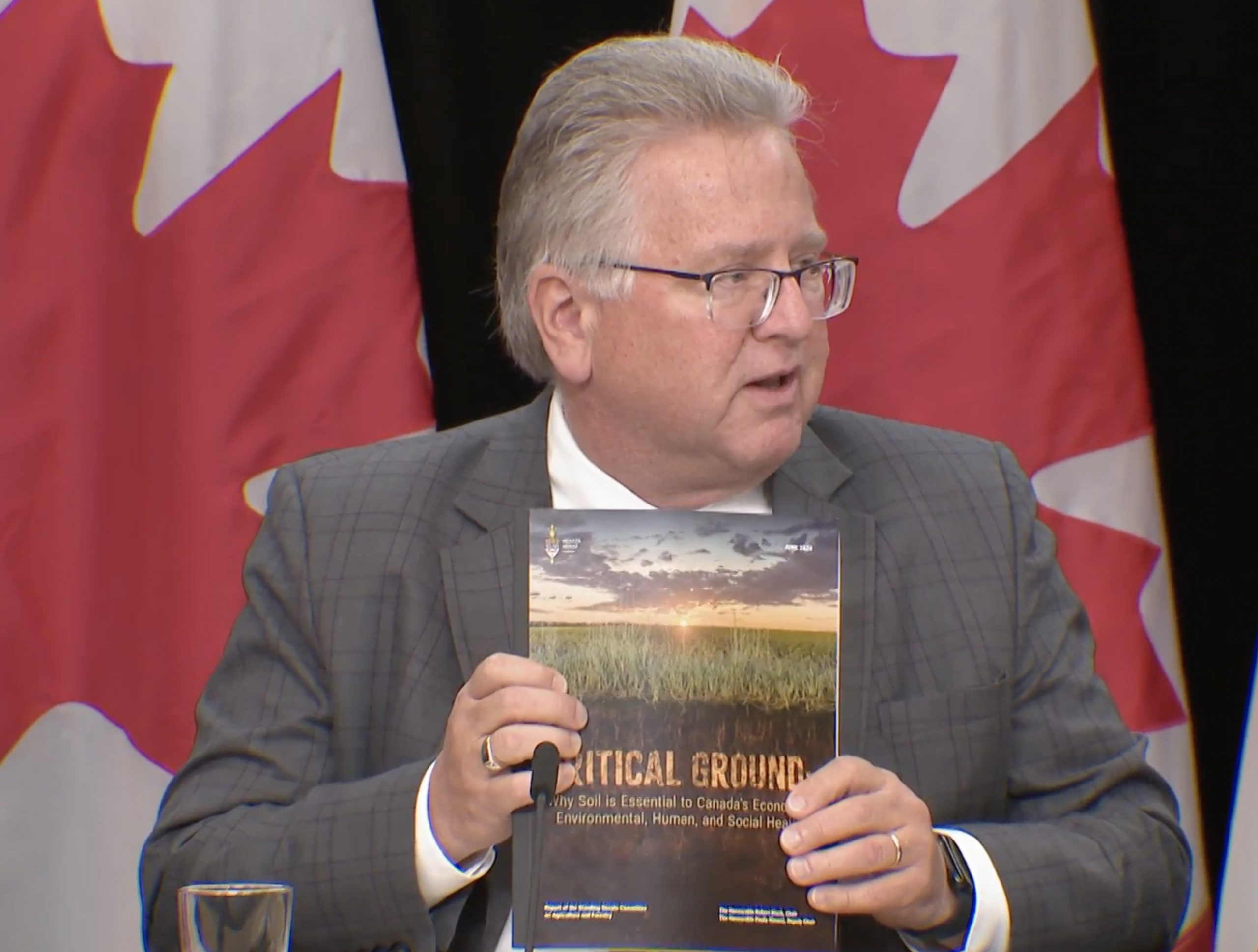OTTAWA – Two years ago, the committee members flanking local Senator Rob Black at a June 6 press conference wouldn’t have considered themselves soil enthusiasts.
Now, they’ve dirtied their hands – and there’s no going back.
Last Thursday’s release of a new Canada-wide soil study by the senate’s Agriculture and Forestry Committee, of which Black chairs, was replete with back-patting and lighthearted, farm-inspired wordplay, but the future for the ground beneath this country’s feet is dire without intervention, senators warned.
Canada’s soil – in all its unglamorous variations, making this country the world’s fifth largest agricultural producer – has been taken for granted and allowed to degrade over decades, Black said.
The senator has been a dogged advocate for a study of Canada’s soils to get a modern baseline for soil health and uses in this country.
“Over the last two years, our committee dug deep into this vital national resource to uncover the reasons why and to cultivate solutions,” Black said.
More than 150 witnesses from across the country neared 60 hours of testimony before the committee since a soil study was approved in 2022.
There were 36 meetings held, and 74 briefs were submitted by the likes of national interest groups and local farmers.
Black and other senators traveled locally to Guelph, westward to Saskatchewan and Alberta, and overseas to the UK and Italy as part of the taxpayer-funded study, estimated to cost upwards of $140,000.
“Canada’s soil is facing unprecedented challenges,” Black said. “We are standing on critical ground.”
According to senate committee expense filings, taxpayers paid at least $112,866 to send some senators on fact-finding trips to Guelph, Saskatchewan, Alberta, Glasgow and Rome.
In 2022, the World Congress on Soil Science was held in Glasgow, UK, and in 2023, the United Nations’ Global Soil Partnership Plenary Assembly took place in Rome, Italy.
The committee learned that extreme climate swings, contamination, urbanization and erosion are all contributing to soil degradation and threatening food sovereignty, livelihoods and the environment at large.
“It’s hard to picture a world with hardly any healthy soil,” Black said. “But it might be the reality facing future generations.”
The senate committee’s newly released report, titled Critical Ground: Why soil is essential to Canada’s economic, environmental, human and social health, advances 25 recommendations for the federal government on how to stop erosion and build up this country’s soil.
Nine of the 25 recommendations explicitly call for the spending of taxpayer dollars – a move Black described as “critical.”
Despite Canada being buried in an increasing national debt load now totalling $1.7 trillion, Black told the Advertiser in an email “the cost of inaction far outweighs the investment.”
The undefined funding recommended in the soil report would “help farmers adopt best practices, access education and training, and invest in technologies that improve soil health,” the senator wrote.
Black acknowledged the national debt load is a “significant concern,” but said funding the recommended initiatives “should be viewed in the context of their potential to prevent much greater expenses down the line and to secure a sustainable future for Canada’s agriculture and overall economy.”
He added, “Healthy soil is fundamental to agriculture, which in turn supports food security, economic stability and rural communities.”
The culmination of the two-year study in the report comes 40 years after the first ever Canadian senate soil study, Soil at risk: Eroding Canada’s future, was released in 1984.
The alarm was sounded then, too.
“Yet our soil is still degrading,” Black said at last week’s announcement.
Canada doesn’t have another four decades to advance the issue and “must act now,” he added.
The recommendations focus on benchmarking the state of Canada’s soil health, funding incentives and initiatives, and promoting soil health. The complete list of recommendations is available online by clicking or tapping here.
Designating soil as a strategic national asset should be priority one, Black suggested, and should be followed immediately by the implementation of a national soils advocate – something the senator said should be “relatively easy” for the government to do.
Designating soil as a strategic resource would set “the stage for government and everyone else,” he said.
At the conference, Senator and committee deputy chair Paula Simons acknowledged the move would be a symbolic gesture to raise the importance of a “rare and precious” resource. So people don’t just say “‘Oh, it’s dirt, why should we care,’” she said.
The government will have 150 days to respond to the report, indicating how it intends to address the 25 recommendations.
Simons said the report serves as a “call to action for Canadians.”
“If you want the government to be held accountable, that’s going to be as much up to the public and the media to help us to do that,” she said.
“What we want to do is have a little bit of an earthquake, a paradigm shift, where we get people to say ‘our soil matters.’”
In his written responses to the Advertiser following the announcement, Black said the committee will be “proactive and vigilant” in following up on the government’s response.
“Through thorough review and continuous engagement, we will work to ensure that the recommendations are considered and that the long-term health of Canada’s soil is safeguarded for future generations,” Black wrote.
With a federal election coming next year, there’s a risk the committee’s work may get lost with a new government’s shifting priorities.
However, Black is optimistic. He noted soil health is “fundamentally non-partisan,” and said the past two years’ work provides a “solid basis for action,” making their efforts difficult to ignore.
Senators and industry leaders will “help keep soil health on the national agenda, ensuring that the recommendations are eventually implemented,” Black said.




